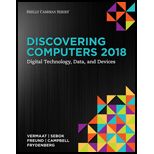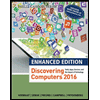
MindTap Computing, 1 term (6 months) Printed Access Card for Vermaat/Sebok/Freund/Campbell Frydenberg's Discovering Computers 2018 (MindTap Course List)
18th Edition
ISBN: 9781337285193
Author: Vermaat, Misty E.; Sebok, Susan L.; Freund, Steven M.; Campbell, Jennifer T.; Frydenberg, Mark
Publisher: Cengage Learning
expand_more
expand_more
format_list_bulleted
Concept explainers
Expert Solution & Answer
Chapter 5, Problem 28SG
Explanation of Solution
Function of encryption
The encryption is also referred as cipher.
- This is a method to convert the readable data to encoded form. Therefore, unauthorized user does not have rights to access that data.
- It is generally done when data are transmitted from one place to another through internet...
Explanation of Solution
Difference among private key and public key encryption:
| Private key encryption | Public key encryption |
| The private key encryption is also referred as symmetric key encryption. | The public key encryption is also referred as asymmetric key encryption. |
| Both sender and receiver use only one secret key for encryption and decryption purpose... |
Expert Solution & Answer
Want to see the full answer?
Check out a sample textbook solution
Students have asked these similar questions
Distinguish between private-key and public-key encryption. Include examples of when and why you would
use each in your response.
Define the following as they pertain to encryption: plaintext, ciphertext,encryption algorithm, encryption key. Differentiate between private and public key encryption.
Computer science
What happens during the encryption procedure?
Chapter 5 Solutions
MindTap Computing, 1 term (6 months) Printed Access Card for Vermaat/Sebok/Freund/Campbell Frydenberg's Discovering Computers 2018 (MindTap Course List)
Ch. 5 - Prob. 1SGCh. 5 - Prob. 2SGCh. 5 - Prob. 3SGCh. 5 - Prob. 4SGCh. 5 - Prob. 5SGCh. 5 - Prob. 6SGCh. 5 - Prob. 7SGCh. 5 - Prob. 8SGCh. 5 - Prob. 9SGCh. 5 - Prob. 10SG
Ch. 5 - Prob. 11SGCh. 5 - Prob. 12SGCh. 5 - Prob. 13SGCh. 5 - Prob. 14SGCh. 5 - Prob. 15SGCh. 5 - Prob. 16SGCh. 5 - Prob. 17SGCh. 5 - Prob. 18SGCh. 5 - Prob. 19SGCh. 5 - Prob. 20SGCh. 5 - Prob. 21SGCh. 5 - Prob. 22SGCh. 5 - Prob. 23SGCh. 5 - Prob. 24SGCh. 5 - Prob. 25SGCh. 5 - Prob. 26SGCh. 5 - Prob. 27SGCh. 5 - Prob. 28SGCh. 5 - Prob. 29SGCh. 5 - Prob. 30SGCh. 5 - Prob. 31SGCh. 5 - Prob. 32SGCh. 5 - Prob. 33SGCh. 5 - Prob. 34SGCh. 5 - Prob. 35SGCh. 5 - Prob. 36SGCh. 5 - Prob. 37SGCh. 5 - Prob. 38SGCh. 5 - Prob. 39SGCh. 5 - Prob. 40SGCh. 5 - Prob. 41SGCh. 5 - Prob. 42SGCh. 5 - Prob. 43SGCh. 5 - Prob. 44SGCh. 5 - Prob. 45SGCh. 5 - Prob. 46SGCh. 5 - Prob. 47SGCh. 5 - Prob. 48SGCh. 5 - Prob. 49SGCh. 5 - Prob. 1TFCh. 5 - Prob. 2TFCh. 5 - Prob. 3TFCh. 5 - Prob. 4TFCh. 5 - Prob. 5TFCh. 5 - Prob. 6TFCh. 5 - Prob. 7TFCh. 5 - Prob. 8TFCh. 5 - Prob. 9TFCh. 5 - Prob. 10TFCh. 5 - Prob. 11TFCh. 5 - Prob. 12TFCh. 5 - Prob. 1MCCh. 5 - Prob. 2MCCh. 5 - Prob. 3MCCh. 5 - Prob. 4MCCh. 5 - Prob. 5MCCh. 5 - Prob. 6MCCh. 5 - Prob. 7MCCh. 5 - Prob. 8MCCh. 5 - Prob. 1MCh. 5 - Prob. 2MCh. 5 - Prob. 3MCh. 5 - Prob. 4MCh. 5 - Prob. 5MCh. 5 - Prob. 6MCh. 5 - Prob. 7MCh. 5 - Prob. 8MCh. 5 - Prob. 9MCh. 5 - Prob. 10MCh. 5 - Prob. 2CTCh. 5 - Prob. 3CTCh. 5 - Prob. 4CTCh. 5 - Prob. 5CTCh. 5 - Prob. 6CTCh. 5 - Prob. 7CTCh. 5 - Prob. 8CTCh. 5 - Prob. 9CTCh. 5 - Prob. 10CTCh. 5 - Prob. 11CTCh. 5 - Prob. 12CTCh. 5 - Prob. 13CTCh. 5 - Prob. 14CTCh. 5 - Prob. 15CTCh. 5 - Prob. 16CTCh. 5 - Prob. 17CTCh. 5 - Prob. 18CTCh. 5 - Prob. 19CTCh. 5 - Prob. 20CTCh. 5 - Prob. 21CTCh. 5 - Prob. 22CTCh. 5 - Prob. 23CTCh. 5 - Prob. 24CTCh. 5 - Prob. 25CTCh. 5 - Prob. 26CTCh. 5 - Prob. 27CTCh. 5 - Prob. 28CTCh. 5 - Prob. 29CTCh. 5 - Prob. 1PSCh. 5 - Prob. 2PSCh. 5 - Prob. 3PSCh. 5 - Prob. 4PSCh. 5 - Prob. 5PSCh. 5 - Prob. 6PSCh. 5 - Prob. 7PSCh. 5 - Prob. 8PSCh. 5 - Prob. 9PSCh. 5 - Prob. 10PSCh. 5 - Prob. 11PSCh. 5 - Prob. 1.1ECh. 5 - Prob. 1.2ECh. 5 - Prob. 1.3ECh. 5 - Prob. 2.1ECh. 5 - Prob. 2.2ECh. 5 - Prob. 2.3ECh. 5 - Prob. 3.3ECh. 5 - Prob. 4.1ECh. 5 - Prob. 4.2ECh. 5 - Prob. 4.3ECh. 5 - Prob. 5.1ECh. 5 - Prob. 5.2ECh. 5 - Prob. 5.3ECh. 5 - Prob. 1IRCh. 5 - Prob. 2IRCh. 5 - Prob. 3IRCh. 5 - Prob. 4IRCh. 5 - Prob. 5IRCh. 5 - Prob. 1CTQCh. 5 - Prob. 2CTQCh. 5 - Prob. 3CTQCh. 5 - Prob. 4CTQ
Knowledge Booster
Learn more about
Need a deep-dive on the concept behind this application? Look no further. Learn more about this topic, computer-science and related others by exploring similar questions and additional content below.Similar questions
arrow_back_ios
arrow_forward_ios
Recommended textbooks for you
 Enhanced Discovering Computers 2017 (Shelly Cashm...Computer ScienceISBN:9781305657458Author:Misty E. Vermaat, Susan L. Sebok, Steven M. Freund, Mark Frydenberg, Jennifer T. CampbellPublisher:Cengage Learning
Enhanced Discovering Computers 2017 (Shelly Cashm...Computer ScienceISBN:9781305657458Author:Misty E. Vermaat, Susan L. Sebok, Steven M. Freund, Mark Frydenberg, Jennifer T. CampbellPublisher:Cengage Learning

Enhanced Discovering Computers 2017 (Shelly Cashm...
Computer Science
ISBN:9781305657458
Author:Misty E. Vermaat, Susan L. Sebok, Steven M. Freund, Mark Frydenberg, Jennifer T. Campbell
Publisher:Cengage Learning